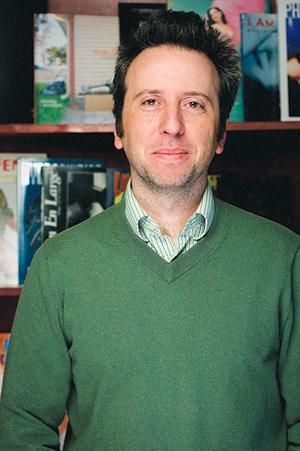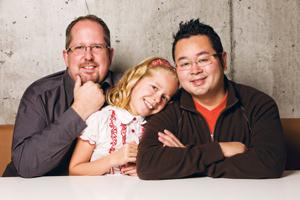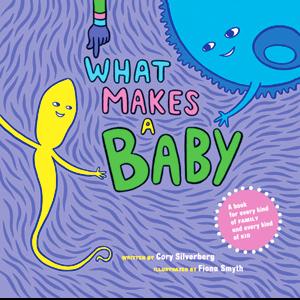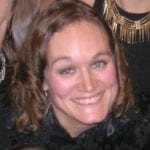
"I like a book that's actually inclusive," says Cory Silverberg.

Kevin Durkee and Tom Douangmixay with their daughter, Taylor. The family was quite taken with And Tango Makes Three, a book about two male penguins who become a couple, then hatch an egg given to them by a zookeeper. Credit: Cheesewerks
Tackling the “birds and bees” can be a tough slog for parents — and giving the “bees and the bees” talk isn’t any easier. But while hetero families benefit from teaching aids like Where Did I Come From? — a book that shows a mommy, a daddy and a sperm in a top hat — other families have had to come up with their own ways to explain the baby-making process. That is, until recently.
Last year, one Toronto sex educator wrote a book that separates conception from relationships in a way that works for all family configurations. And, thanks to a recently awarded book deal, there will soon be two more.
Cory Silverberg conceived the idea for What Makes a Baby? after realizing that, despite the existence of plenty of kids’ books that feature different kinds of families, very few cover the nitty-gritty details of how a baby goes from “twinkle in the eye” to fully formed human within a non-hetero context.
“Most of the material that’s come out of queer culture is for adults . . . and most of the kids’ books just share one experience, like Heather Has Two Mommies,” Silverberg says. “I like a book that’s actually inclusive, and this book works whether the family has used sperm donation, egg donation, surrogacy or has a single parent. It’s a book that doesn’t talk about intercourse.”
It does, however, leave plenty of space for parents to tell their own stories, facilitating the conversation in a somewhat structured way.
“Everybody was like, ‘Are you sure this book doesn’t exist already?’ But surprisingly, it didn’t,” says Silverberg, who made a video explaining this conundrum in early 2012 and used it as the centrepoint of a month-long Kickstarter campaign. He sought to bring in $9,500 to publish the books but earned a whopping $65,516 instead. He did a self-published run in June and a few months later was offered the book deal.
What Makes a Baby? is targeted at kids aged four to six and will be released by Seven Stories Press in May. Books for slightly older age groups will follow it for two successive years.
While the first book focuses on the science behind conception, the others will get into details, such as body parts, while steering clear from linking the shape of one’s body to one’s destiny, Silverberg says. He believes kids’ books that define masculinity and femininity in particularly simplistic ways do a lot to sow seeds of inadequacy for children who grow up to discover they don’t conform to those definitions.
“Many books say that if you have a penis and a scrotum, you are a man and can become a daddy,” he says.
The books come at a good time, considering the increasingly diverse makeup of Canadian families. Census statistics released in September show that “traditional” nuclear families of a mom, dad and two kids are decreasing, while same-sex and single-parent families are increasingly common. The figures, collected in 2011, showed 42 percent more same-sex couples and eight percent more single-parent families than the previous enumeration, in 2006.
This growing diversity is a huge relief for one Toronto mom, who didn’t want her name used to protect the privacy of her children. A lesbian who is now divorced from her sons’ other mother, she says it was a relief to find that her family isn’t so different after all.
“What we couldn’t have known was how diverse families really are in Toronto,” she says. “There are so many variations in what makes a family that no one has questioned or faltered with our family definition.”
When it comes to explaining sex and conception to her kids, she says she long told them that they were “loved” into the world by both their moms.
“This summer, however, my eldest son figured out that there was a part of the story missing,” she says. Her son, who is nine, asked for more details, so she explained how his other mom became pregnant, using donated semen and a syringe.
“We never bought any special books, just practised as best as we could age-appropriate honesty,” she says. “My boys know that I like men but that I like women in that kissing kind of way. We have made [talking about sex] inclusive: man and woman, two men, two women, et cetera.”
Kevin Durkee and Tom Douangmixay say their daughter, Taylor, who was carried by a surrogate, has never been too focused on the technical details of where she came from — perhaps because they’ve tried to be open and upfront with her ever since she began asking questions.
“My parents had a conversation with me about the birds and the bees, and none of that’s changed,” Durkee says. However, he says he’s always interested in seeing more diverse kids’ books, noting his family was quite taken with And Tango Makes Three, a book about two male penguins who form a couple and eventually hatch an egg given to them by a zookeeper.
He said reading the book helped provide his daughter with some context about their family, and it worked so well they gave a copy to her daycare to help educate the other kids.
“Tay’s had the odd question about us on the schoolyard, but for the most part, I think she just shrugs it off,” he says. “It’s quite unique to see how much we can mould and shape and educate them right from the beginning.”


 Why you can trust Xtra
Why you can trust Xtra


